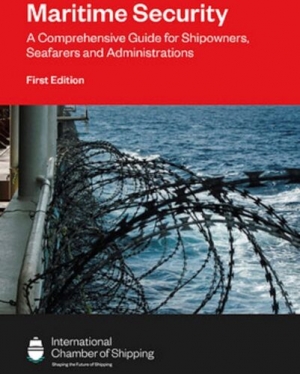


(Posted on 11/04/21)
As recent news reports highlight, the shipping industry continues to face threats such as piracy, kidnapping and terrorism. Ship operators need to stay alert to security risks and recognise that threats are continually evolving and demand constant vigilance.
To assist the shipping community in preparing for these challenges the International Chamber of Shipping has launched the first edition of Maritime Security: A Comprehensive Guide for Shipowners, Seafarers and Administrations.
Providing a comprehensive guide to maritime security, the publication draws on over twenty years’ experience of the growing security threats faced by shipping. It sets out the security threats faced by the shipping industry today, the statutory requirements that ships, shipping companies and port facilities must meet, and provides guidance on how to conduct a thorough threat assessment for a voyage. A model ship security plan is also provided along with guidance on how to complete it in accordance with statutory requirements.
Secretary General of the International Chamber of Shipping, Guy Platten says: “Maritime security is a continual concern for the shipping industry, and security threats present real challenges to the entire global supply chain.
“In the years since SOLAS and the ISPS Code set out the dedicated statutory framework for the issue, we have witnessed the emergence of a security culture in the industry with a growing awareness of security threats , and an understanding of the importance of following best practices to mitigate risks to seafarers and the global trade they sustain.This new guide provides invaluable information to help keep ahead of the situation.”
Maritime Security: A Comprehensive Guide for Shipowners, Seafarers and Administrations has been written for ship and terminal operators, seafarers and administrations, but will also provide a useful entry point to the subject for anyone with an interest in maintaining the security of global trade.
Maritime security is enforced through Chapter XI-2 of the SOLAS Convention and the International Ship and Port Facility Security (ISPS) Code, which entered into force on 1 January 2004. The regulations and code enforce statutory requirements for ships and port facilities with respect to their own security and the interface between them. Obligations are placed on the shipowner, the port and their respective personnel, and are overseen by the flag State and shoreside Competent Authority, who also have a responsibility to ensure the security of the assets under their jurisdiction.
The key requirement of the regulation and Code is for the development of a ship specific security plan for every ship of 500 GT and over. Similarly, there is an obligation on port facilities to develop and implement a Port Facility Security Plan (PFSP). The Code also sets out carriage requirements for equipment to track and identify ships, including automatic identification system (AIS) and long-range identification tracking (LRIT).
However, security threats are dynamic and varied, requiring constant vigilance by companies, ships and seafarers to ensure their security, and a body of best practice guidance has developed in recent years to ensure continued self-protection in the face of these threats.
AtoB@C Shipping, a subsidiary of ESL Shipping, has announced the successful delivery of Fleximar, the... Read more
Western Bulk, together with reputable Norwegian partners A/S J. Ludwig Mowinckels Rederi, Premium Maritime... Read more
Pacific Basin Shipping Limited, one of the world’s leading dry bulk shipping companies, has announced... Read more
Columbia Group anticipates a period of strong expansion as an increasing number of international shipowners... Read more
Norse?Ship Management has expanded its use of Smart Ship Hub’s high frequency sensor data and... Read more
As the maritime industry gears up to welcome the IMO’s STCW bullying and harassment training amendments... Read more
NORDEN has acquired the cargo activities of Taylor Maritime in Southern Africa (previously operated... Read more
Philippos Ioulianou, Managing Director of EmissionLink, has warned the IMO’s decision to delay... Read more
VIKAND has highlighted the need for cultural change in the maritime sector as reports of bullying, harassment... Read more
The maritime industry is experiencing a period of significant transformation, driven by rapidly evolving... Read more